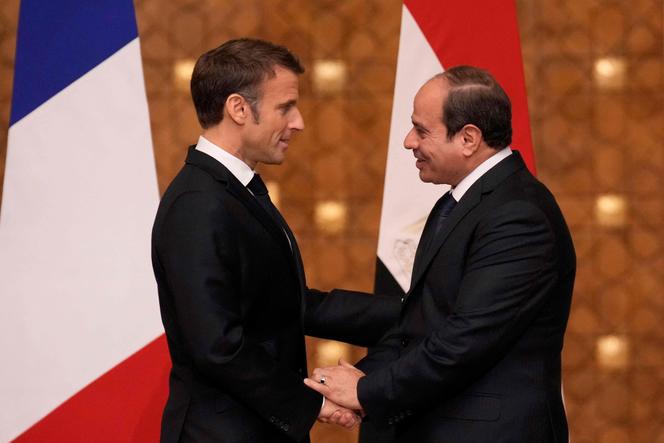


French President Emmanuel Macron met his Egyptian counterpart Abdel Fattah el-Sissi on Wednesday, October 25, calling for a return to the Israel-Palestinian peace process, on the latest leg of a whistlestop crisis tour. He said that France would be sending a navy ship and medical equipment to support Gaza's hospitals within the next 48 hours.
At their joint news conference in Cairo, Sissi said he and Macron had discussed "the importance of striving to avoid a ground invasion" of Gaza, because of the "many, many civilian casualties" it could cause. Macron, responding to claims by Arab leaders who have accused Western nations of overlooking harm to Palestinians, said "France does not practice double standards, international law applies to everyone and France has always carried the universal values of humanism."
Sissi called for a de-escalation, ceasefire and return to diplomacy, stressing that "the lack of a political horizon" had led to the current war. Macron echoed Sissi's support for a "two-state solution" – the cornerstone of negotiations between Israelis and Palestinians that have been stalled for years. "It is difficult at the moment to talk about the resumption of a peace process," Macron said, adding however that "it is more necessary than ever." Before meeting Macron, Sissi inspected Egyptian troops and spoke in a televised address of "patience" and "wisdom."
Arab leaders have repeatedly pushed for a return to a political process, echoing wider warnings of a potential regional spillover of the Hamas-Israel war. Jordan's King Abdullah II, who hosted Macron on Tuesday, warned against "the continuation of the war on the Gaza Strip, which might lead to an explosion in the situation in the region."
"You must always be ready," he told them, three days after an Egyptian border watchtower was hit and guards were wounded by accidental Israeli shelling. He said Egypt was doing "all it can" to push for de-escalation and a ceasefire, as well as to "support civilians in Gaza" by sending aid through the Rafah border crossing.
On Tuesday, Macron was in Israel where he voiced support for its retaliation against Hamas after gunmen from the Islamist group unleashed the deadliest attack on Israel in its history on October 7. He then visited Ramallah, where he met with Mahmoud Abbas, the president of the Palestinian Authority.
After more than two weeks of relentless bombardment and siege by Israel, Gaza's already-fragile healthcare system is at risk of collapsing, with hospitals running out of essential supplies and fuel to power generators.
Humanitarian aid has been allowed to trickle in through Rafah, but the United Nations warns a massive scale-up is needed to meet the needs of 2.4 million people in Gaza – half of whom have been displaced. Macron also said it would send a planeload of medical equipment to Egypt to be transported into Gaza via the Rafah crossing, the only passage in and out of the besieged territory not controlled by Israel.
Hamas militants attacked southern Israel, killing more than 1,400 people, most of them civilians, according to Israeli authorities. In relentless Israeli bombing since, more than 6,500 people, mostly civilians, have been killed in the Gaza Strip, according to the Hamas-controlled Health Ministry.
